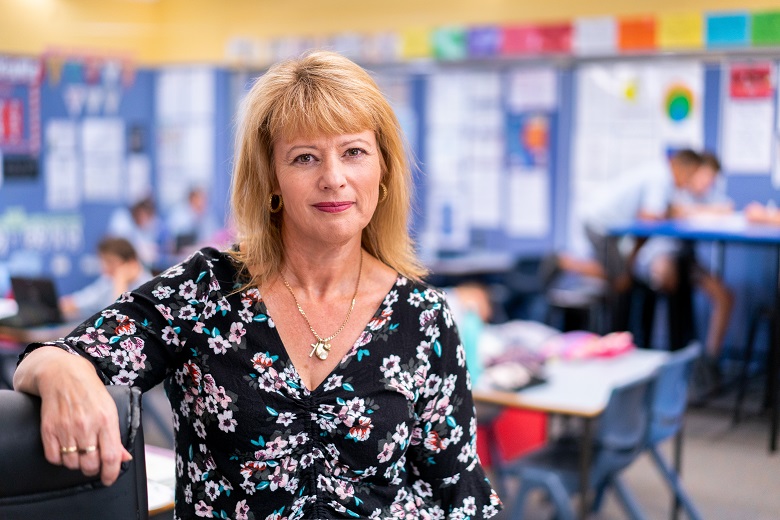Commonwealth Bank Teaching Awards
MONICA ST BAKER
Hanwood Public School (NSW)
SHORT BIO
Despite the challenges of its small size and remoteness, Principal Monica St Baker has embedded contemporary teaching philosophies at Hanwood Public School, and students’ achievements are improving in response.
She has introduced a new flexibility – both in the curriculum, which now supports project-based learning, and in the use of classroom space, encouraging the primary students to, “explore greater levels of academic growth, with feedback, success criteria and reflection.”
Three years in, teachers are mentoring each other in the new approaches, while parents say students are more excited about learning and families more involved.
The community is also part of the transition; teachers regularly invite local people to talk to students about their work or other expertise.
Project work has lifted writing skills above the Australian average in Year 5 NAPLAN, and Hanwood has also risen two bands against the School Excellence Framework.
LONG BIO
Hanwood is the epitome of a tiny Australian town. Five kilometres south of Griffith, deep in southern NSW, the 2011 Census reported its population at 1490.
Size should be no barrier to a quality education, according to Monica St Baker, Principal of the 266 student Hanwood Public School: “I am a passionate believer that country students should not be disadvantaged due to remoteness and location,” she said. “It is my role to ensure my students are provided with every opportunity to excel academically.”
Recognising the need to modernise teaching practice, in 2016 Mrs St Baker initiated a program of change across the school. She introduced project-based learning, flexible learning spaces and metacognitive writing – in which students are encouraged to think actively about themselves as writers and learners.
The approaches combine to let teachers concentrate on the unique needs of students. “We are determined to cater to the individual,” Mrs St Baker said, “focusing on achievement, wellbeing and the capacity for teachers and students to explore greater levels of academic growth, with feedback, success criteria and reflection.”
She has emphasised instructional leadership and mentoring of her teaching staff of 11, backed by a significant investment in their professional learning and a parallel focus on high expectations and standards.
Initially Mrs St Baker conducted the mentoring herself; increasingly as staff members acquire new skills, that responsibility is devolving to other school leaders and teaching peers.
Teachers are also expected to engage the whole community in Hanwood’s progress, inviting relevant people to talk to the students about their work or other topic of expertise.
Amid the many challenges, culture has been among the most significant; in a small community, some teachers were hesitant about such radical change while some parents had fixed, traditional mindsets about how school should be, and were initially confronted by the school’s “adventurous” path and innovations in teaching and the physical environment.
Gradually, parents and the broader community have come on board. Attendance is riding high at the project exhibitions that are now a regular fixture, and parents have begun to ask more openly about the new methods.
Mrs St Baker then progressed to surveying families in more detail about their student’s engagement and excitement with their work, whether it had prompted family discussions, and their perceptions of support from teachers. The verdict: parents reported huge positive changes in their children’s attitude to school work.
There is still a distance to go, but 2018 NAPLAN data shows Year 5 students are now achieving above the national average in writing. Measured against the School Excellence Framework, Years 3-5 students have also bumped up a notch, progressing from the lowest evaluation ‘Working Towards Delivering’ to ‘Sustaining and Growing’ – the second highest.
Mrs St Baker is committed to staying the course. “I am grateful for every opportunity that allows me to expand my educational knowledge to strive for academic excellence for my students,” she said.



